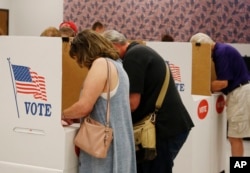Whatever happens in next month's midterm elections, women candidates have already made history.
There are more female nominees for public office nationwide than ever before.
Twenty-three women are in the running for the U.S. Senate — 15 Democrats and 8 Republicans. Four of those women are running in states with open seats, which means they will not face an incumbent. There are 35 Senate contests in 33 states this year.
All 435 seats in the House of Representatives are up for grabs; 239 women remain in the race — 187 Democrats and 53 Republicans. There is no incumbent in 47 of the contests.
Sixteen women are running for governor in their states. And 3,381 women are on the ballot for their state legislatures — about half of whom are incumbents, while the other half are challengers.
Some people are coining 2018 as the "Year of the Angry College Educated Woman," likening the current political dynamics to 1994's "Year of the Angry White Male" when Republicans unexpectedly captured control of both the House and Senate.
Kelly Dittmar, a scholar at the Center for American Women in Politics at Rutgers views the 2016 election of President Donald Trump as a catalyst for some women who'd already been active to get more involved.
"In many cases, women in the past would say, 'We can make more of a difference from the outside,' and I think this year there is a recognition that their voices and their perspectives and their experiences need to be at those decision making tables," Dittmar says.
The public seems to agree that there should be more women in decision-making roles. The presence of women in a deliberative body increases the public's view of that body's legitimacy, especially when the group decisions impact women, according to a report compiled by three political scientists. The findings suggest that both men and women favor the inclusion of women decisionmakers.
Whether or not that enthusiasm translates into political victories for female candidates, women will still be vastly underrepresented in the U.S. Congress. Women currently make up about 19 percent of the House of Representatives. That number could rise to as high as 25 percent after the November elections.
Dittmar chafes at the idea of dubbing 2018 as the "Year of the Angry College Educated Woman." She has hopes that the energy, enthusiasm and engagement of women will prove to be a lasting phenomenon and not an anomaly.
"Part of the way it sustains itself or that we sustain it is by not calling this a 'Year of the Woman' and not talking about it as some idiosyncratic year in which all these confluence of factors allowed for women to run," Dittmar says. "I think we play a role in saying, No, this is something that can continually be done and this year can actually set the foundation for a trend in which we see more women running each year."
Many of the women candidates are seasoned politicians who have been laying the groundwork for their runs for public office for years. They hardly fit the monolithic idea that all women candidates and voters are "angry."
Consider Stacy Abrams, the Democrat running for governor of Georgia, who has been in state politics for more than a decade and could become the nation's first African-American female governor.
Republican Cindy Hyde-Smith, who was appointed to the U.S. Senate this year to fill a vacated seat, has already served in the Mississippi State Senate, and is likely to become the first woman elected to Congress in Mississippi.
However, those women who are angry are dealing with their frustration in a different manner than before.
"What is new and unique and important about this year is channeling that anger both into showing up as voters [and as candidates], although women have outvoted men in every election since 1980 so that's not entirely new, it's just that the level of enthusiasm is even higher," Dittmar says.








